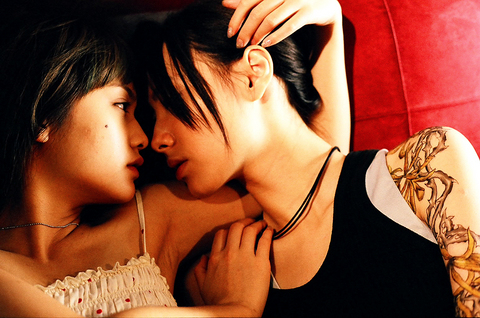The first Taiwanese movie to win the Teddy Bear Award for Best Gay/Lesbian Film at the Berlin Film Festival, feature and documentary director Zero Chou's (周美玲) Spider Lilies (刺青) offers a much needed addition to the mainstream cinematic representation of homosexuality with its melodramatic story on lesbian love starring teenage idols and pop stars.
Taiwan's cutesy star Rainie Yang (楊丞琳) plays a cybersex webcam girl named Jade. Looking for sexy tattoos to excite his clients, Jade stumbles across Takeko's (Isabella Leong) tattoo parlor and is immediately fascinated by the framed spider-lily tattoo on the wall and is determined to have it. The reticent parlor owner, however, is reluctant to take the case.
Unbeknownst to Jade, the design was cut from the flesh of Takeko's father who was killed in an earthquake. Her brother is unable to recognize anyone and the lily is his last coherent memory. Out of guilt (Takeko was in her then girlfriend's arms when the catastrophe took place), the tattooist has the poisonous flower tattooed on her arm as a symbol of the tragedy and her repressed homosexual feelings.

What the tattoo artist doesn't realize is that she and Jade actually met each other 10 years previously when the nine-year-old Jade had a serious crush on her. Dauntlessly, Jade is determined to pursue her first love and reawaken Takeko's dormant emotions.
Continuing the visual cues and drama of her award-winning feature debut, Splendid Float (艷光四射歌舞團), about the lives of drag queens, Chou's use of melodrama is said to share an affinity with the works of Spanish master Pedro Almodovar, and her films successfully create a color-saturated local cosmos inhabited by socially marginalized tenants.
The whirls of green, purple, blue and red in Jade's room heightens a sense of virtual reality that is occasionally broken by her visually impaired grandmother. The lush secret garden Takeko and her brother visit every night, which is reminiscent of Henri Rousseau's paintings of jungles, is a mysterious dream world where the sub-consciousness works its magic.
Pretty to look at and easy to digest, the film nevertheless touches upon the practice of perfomativity and role-playing in homosexual culture through the juxtaposition of the virtual and real identities of Jade who sometimes appears as a doll-like webcam girl and sometimes in high-school uniforms to meet the her own and others' fantasies.
Besides the identity issues, Chou has sketched a unique aesthetic of homosexuality firmly rooted in grassroots culture. Representing the community in the playful context of popular culture, such as the drag queens dancing and singing on the decorated truck in Splendid Float, the lesbian director strategically links gay culture with a localized identity.
Despite its visually opulent scenes and interesting insights on the aesthetics of homosexuality, the film's main flaws are a thin script and weak character development. The plot seems stretched and amateurish at times and doesn't take full advantage of a promising narrative structure, the young actors themselves are seen struggling in the underdeveloped roles with flat facial expressions and the subplots involving a shy Internet cop and the rogue Adong.
Considering the film is only Chou's second feature, the director has the potential to secure a foothold in the mainstream market and help homosexuality come out of the closet on the silver screen.

May 11 to May 18 The original Taichung Railway Station was long thought to have been completely razed. Opening on May 15, 1905, the one-story wooden structure soon outgrew its purpose and was replaced in 1917 by a grandiose, Western-style station. During construction on the third-generation station in 2017, workers discovered the service pit for the original station’s locomotive depot. A year later, a small wooden building on site was determined by historians to be the first stationmaster’s office, built around 1908. With these findings, the Taichung Railway Station Cultural Park now boasts that it has

The latest Formosa poll released at the end of last month shows confidence in President William Lai (賴清德) plunged 8.1 percent, while satisfaction with the Lai administration fared worse with a drop of 8.5 percent. Those lacking confidence in Lai jumped by 6 percent and dissatisfaction in his administration spiked up 6.7 percent. Confidence in Lai is still strong at 48.6 percent, compared to 43 percent lacking confidence — but this is his worst result overall since he took office. For the first time, dissatisfaction with his administration surpassed satisfaction, 47.3 to 47.1 percent. Though statistically a tie, for most

As Donald Trump’s executive order in March led to the shuttering of Voice of America (VOA) — the global broadcaster whose roots date back to the fight against Nazi propaganda — he quickly attracted support from figures not used to aligning themselves with any US administration. Trump had ordered the US Agency for Global Media, the federal agency that funds VOA and other groups promoting independent journalism overseas, to be “eliminated to the maximum extent consistent with applicable law.” The decision suddenly halted programming in 49 languages to more than 425 million people. In Moscow, Margarita Simonyan, the hardline editor-in-chief of the

Six weeks before I embarked on a research mission in Kyoto, I was sitting alone at a bar counter in Melbourne. Next to me, a woman was bragging loudly to a friend: She, too, was heading to Kyoto, I quickly discerned. Except her trip was in four months. And she’d just pulled an all-nighter booking restaurant reservations. As I snooped on the conversation, I broke out in a sweat, panicking because I’d yet to secure a single table. Then I remembered: Eating well in Japan is absolutely not something to lose sleep over. It’s true that the best-known institutions book up faster